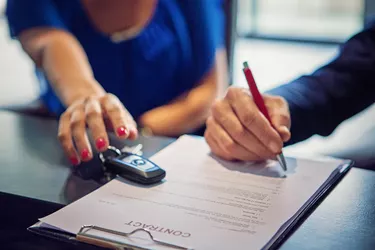When you're ready to trade your old car in for a new one, you have two major options. You can sell it on your own privately using craigslist or a paid service like cars.com, or you can take it to the dealer and get an offer. Although you may be able to get more on your own, the process can be both risky and time-consuming. But with some careful upfront research, you can maximize the amount you get from a dealer while also avoiding the inconvenience of selling it yourself.

Video of the Day
How to Sell Car to Dealership
When you take your car to a dealership to sell it, the first thing they'll do is inspect it for issues. Maximize your return by first taking it to an affordable mechanic for a complete once-over before you try to sell it. If it has major issues, weigh the cost of repairing them to the amount the dealer will take off for it.
Video of the Day
During this time, also research your car's market value. Kelley Blue Book® reports the market value for both new and used cars, offering the price for private sale, trade-ins and retail value. Having these numbers in mind may help you better negotiate with the salesperson. If you're purchasing a newer car and asking for a trade-in, avoid telling the dealership if you plan to pay cash until they've quoted a price on the car you're buying. Often, you'll get a better deal if the dealership knows you're financing it through them.
Sell Car to Dealership Pros
The biggest benefit of selling your car to the dealership is how easy it is. You can generally pull into the lot, find the car you want and ask for a price on the car you're trading in. If your dealership of choice doesn't have the exact make, model and trim you want, they should be able to order it for you and have it delivered directly to the lot.
Another advantage of going this route is that a dealership is ready to buy. Unlike private buyers, who may not have enough cash to pay for it, you can either deposit the money into your account that day or put it toward a new car purchase. With private buyers, you may have to wait to see if they can get the financing. You also face a level of risk when selling to a private party, since any buyer will likely want to take a test drive and you'll need to ride along while a stranger drives your car.
Sell Car to Dealership Cons
Money is the biggest downfall to selling to a dealership. Any dealer is going to want to make a profit on the cars it sells, so naturally you'll be offered a lower price. You can try to offset this by walking in knowing what your car is worth, according to Kelley Blue Book®, and understanding that the dealer is going to turn around and sell your vehicle for more.
If you're trading your vehicle in for a car at the dealership, you may also find that you lose some of your negotiating power. Because you're trying to get the most money you can for your existing car while paying the least you can for your newer car, you'll have to divide your negotiations. If you sell privately, on the other hand, you're walking in with only the intent of making a purchase, allowing both you and the salesperson to concentrate on one negotiation.
Can You Sell a Car If You Still Owe Money on It?
If you're still paying on your car, you'll have an extra step to add into the mix. If the bank still holds your title, you'll need to pay the balance off before you can officially be rid of the car. Before you even start looking to sell, contact your bank and find out how much you'll need to completely pay it off. Also ask if you need to do anything in particular if you want to sell the car.
The next part is easier if you're going through a dealer. Dealers regularly work with customers who still owe money on the cars they're selling. They can work with the bank to get the title transferred to them. If you're selling privately, you may need to arrange to meet the buyer at the bank, where you can hand the funds over that then puts the title back in your name. The bank will then arrange to have the title sent to the buyer's bank once the transaction is complete.